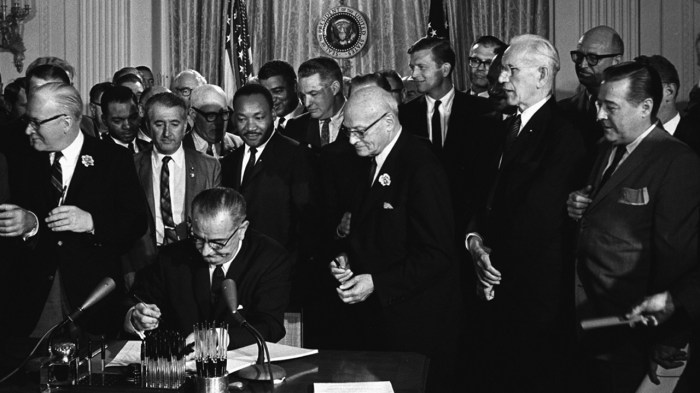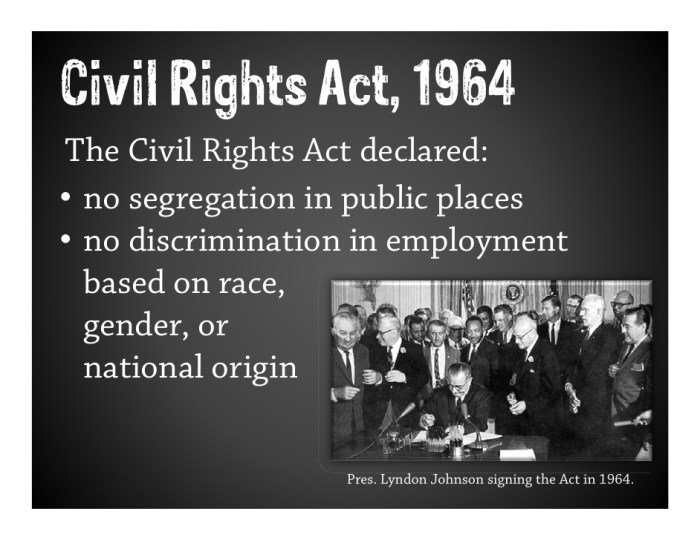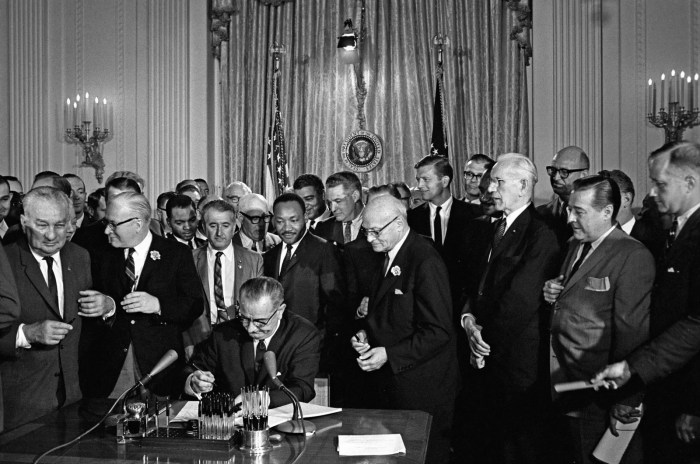Civil rights act of 1964 ap gov – The Civil Rights Act of 1964 stands as a beacon of hope and a testament to the indomitable spirit of the American people. This landmark legislation marked a watershed moment in the fight for equality and justice, forever etching its significance in the annals of American history.
This Act was not merely a legal document; it was a clarion call for change, a resounding affirmation of the inherent dignity and worth of every individual, regardless of their race, color, religion, sex, or national origin. Its provisions, meticulously crafted to address the systemic discrimination that plagued American society, would serve as a catalyst for profound societal transformation.
Historical Context

The Civil Rights Act of 1964 was the culmination of decades of struggle for racial equality in the United States. The social and political climate leading up to the Act was marked by widespread discrimination against African Americans in all aspects of life, from voting to housing to education.
The Civil Rights Movement, which gained momentum in the 1950s and 1960s, played a pivotal role in shaping the Act. Key events such as the Montgomery Bus Boycott, the Little Rock Nine, and the March on Washington for Jobs and Freedom brought national attention to the issue of racial inequality and helped to build support for federal legislation.
Key Figures, Civil rights act of 1964 ap gov
Numerous individuals played crucial roles in the Civil Rights Movement and the passage of the Civil Rights Act of 1964. Among them were:
- Martin Luther King Jr.:A Baptist minister and civil rights leader, King advocated for nonviolent resistance and was a key figure in the Montgomery Bus Boycott and the March on Washington.
- Rosa Parks:An African American woman who refused to give up her seat on a bus to a white man, sparking the Montgomery Bus Boycott.
- John F. Kennedy:The 35th President of the United States, Kennedy introduced the Civil Rights Act of 1964 to Congress and supported its passage.
- Lyndon B. Johnson:The 36th President of the United States, Johnson signed the Civil Rights Act of 1964 into law and worked to ensure its implementation.
Impact of the Act

The Civil Rights Act of 1964 was a landmark piece of legislation that had a profound impact on American society. The act outlawed discrimination based on race, color, religion, sex, or national origin in employment, public accommodations, and government programs.
The immediate impact of the act was to desegregate public places such as schools, restaurants, and hotels. It also led to increased employment opportunities for African Americans and other minorities. In the long term, the act has helped to create a more just and equitable society for all Americans.
Advancement of Civil Rights
The Civil Rights Act of 1964 has contributed to the advancement of civil rights in many ways. For example, the act:
- Prohibited discrimination in employment, public accommodations, and government programs.
- Established the Equal Employment Opportunity Commission (EEOC) to enforce the act’s provisions.
- Authorized the Attorney General to file lawsuits to desegregate schools and other public facilities.
The act has also been instrumental in the passage of subsequent civil rights legislation, such as the Voting Rights Act of 1965 and the Fair Housing Act of 1968.
The Civil Rights Act of 1964 AP Gov is a landmark piece of legislation that outlawed discrimination based on race, color, religion, sex, or national origin. The act had a profound impact on American society, and its effects are still felt today.
If you’re looking for more information about the Civil Rights Act of 1964 AP Gov, I recommend checking out the weather maps gizmo answer key . It provides a comprehensive overview of the act, its history, and its impact. The Civil Rights Act of 1964 AP Gov is a testament to the power of the law to create change and to make a more just and equitable society.
Challenges and Controversies

The Civil Rights Act of 1964, despite its significant impact on American society, faced challenges and controversies during its implementation and enforcement.
Resistance and Backlash
Following the passage of the act, there was widespread resistance and backlash from certain segments of the population, particularly in the Southern states. Many white Southerners opposed the desegregation of public facilities and schools, leading to violence, intimidation, and the formation of segregationist organizations.
Legal Challenges
The Civil Rights Act of 1964 also faced numerous legal challenges. Critics argued that the act violated states’ rights and infringed upon individual liberties. These challenges were often brought to court, resulting in a series of legal battles that tested the boundaries of the act.
Ongoing Debates
Even today, the Civil Rights Act of 1964 remains a subject of ongoing debates and legal battles. Some argue that the act has not gone far enough in addressing racial discrimination, while others contend that it has led to reverse discrimination against white Americans.
Legacy and Significance: Civil Rights Act Of 1964 Ap Gov

The Civil Rights Act of 1964 stands as a monumental milestone in American history, leaving an enduring legacy that has profoundly shaped the nation’s social and political landscape. Its passage marked a watershed moment in the struggle for civil rights, dismantling the legal framework of segregation and discrimination that had persisted for centuries.The
Act’s impact has been far-reaching, extending beyond the immediate dismantling of discriminatory practices. It has fostered a culture of equality and respect for human rights, serving as a catalyst for subsequent advancements in civil rights and social justice.
Enduring Impact on Civil Rights
The Civil Rights Act of 1964 has had a profound impact on the legal and social fabric of the United States. Its provisions have played a pivotal role in:
- Prohibiting discrimination based on race, color, religion, sex, or national origin in public accommodations, employment, and government programs.
- Establishing the Equal Employment Opportunity Commission (EEOC) to enforce the Act’s provisions in the workplace.
- Desegregating public schools and universities, fostering a more equitable educational system.
- Providing federal protection for voting rights, ensuring equal access to the ballot box for all citizens.
Legacy of Social Justice
Beyond its legal impact, the Civil Rights Act of 1964 has had a transformative effect on American society. It has:
- Fostered a greater awareness and understanding of the injustices faced by marginalized communities.
- Inspired countless individuals and organizations to work towards social justice and equality.
- Created a more inclusive and just society, where all citizens have the opportunity to reach their full potential.
The legacy of the Civil Rights Act of 1964 is one of hope, progress, and the enduring pursuit of equality. It stands as a testament to the power of collective action and the unwavering determination to create a more just and equitable society for all.
FAQ
What were the key provisions of the Civil Rights Act of 1964?
The Act prohibited discrimination based on race, color, religion, sex, or national origin in employment, public accommodations, government programs, and federally funded programs.
What was the significance of the Civil Rights Act of 1964?
The Act was a major victory for the civil rights movement and helped to end legal segregation and discrimination in the United States.
What are some of the challenges and controversies surrounding the Civil Rights Act of 1964?
The Act has been criticized for not going far enough to address economic inequality and for its limited impact on housing discrimination.